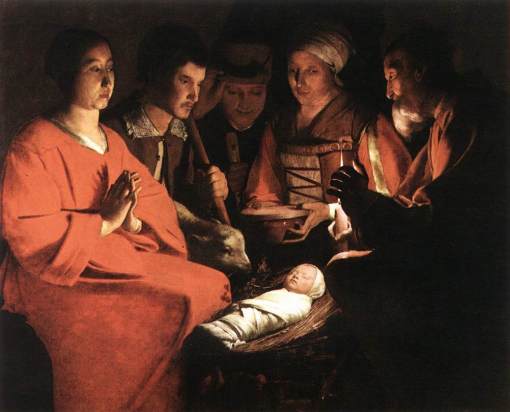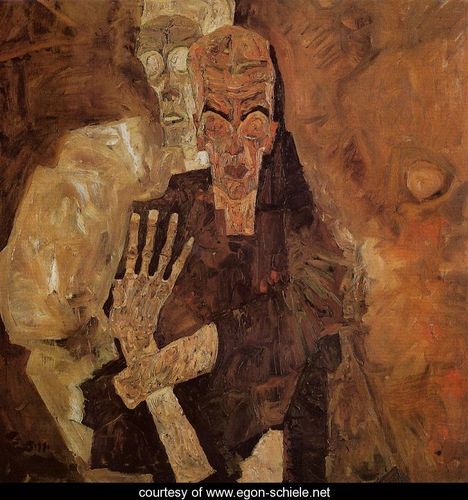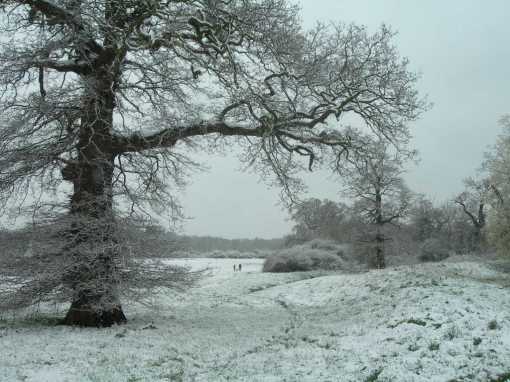December 2010
Monthly Archive
December 25, 2010

Have you ever looked into the face of a tiny baby and wondered what will be in store for that child – how his or her life will unfold across the years?
There is an exquisite painting which hangs in the great museum of The Louvre, in Paris. It is called ‘The Adoration of the Shepherds’, by George de la Tour. It shows the Nativity Scene: a dark stable, with Mary, Joseph and the shepherds gazing on the sleeping child Jesus, wrapped in linen and lying on straw. Joseph holds a lighted candle and a lamb feeds on the straw. Joseph’s frail little light reveals the rapt attention of those shepherds, the loving gaze of Mary and his own fascination with the new-born baby.
Are they all wondering who the child will become as he grows? What life has in store for him? Are they asking themselves ‘Will there be a world in which the child can grow and flourish and become a man?’?
Do you wonder this for your own children and grandchildren, for the children who worship here week by week? What kind of world are we bringing them in to? What dangers? What opportunities?
De la Tour’s picture is remarkable because it suggests so poignantly all those very natural human concerns that we might share with the little group gathered around the baby as they look upon the beauty and vulnerability of a tiny child.
But this child, the child of the painting, seems to emit his own strange light – not the light of Joseph’s candle, but a beautiful, searching, spiritual light which shows up the faces of Mary and Joseph and the rough shepherds. The light of the Christ-child shows not only the questions and anxieties in the faces looking down on him, but also their spiritual wonder and prayer and joyful expectation. Somehow this ordinary child casts a light into the darkness which shows the ordinary mother and ordinary husband and ordinary rough old shepherds as extraordinary beautiful, spiritual beings – children of God, reflecting God’s image. The child’s light shows them in God’s light – yes, their flaws and failures and weariness as human beings, but also that they are beloved in God’s eyes, God’s children, vulnerable themselves, in need of love.
De la Tour’s picture, the lovely Crib-scene set up here in church, the Nativity story we celebrate again tonight in word and song, casts us in God’s light. It exposes us: shows up our loss of innocence, our cynicism and selfishness – how taken-up we are in our own concerns, how anxious. And yet that same light of the Christ-child reveals our longing to love and be loved, our capacity for concern and for compassion, the goodness in us which is ours as God’s children.
This child-light has the power to draw us in: it invites us to question, yes, and also to worship and to wonder; to see and search for that which can set us free for grace and love. The Nativity shows the heart of love; the sheer awe and wonder of God’s life. It promises the joy, a deep and lasting joy, which comes from knowing that we are loved by God in Christ.
As you look on the Christ-child tonight, what is your prayer? What do you seek for yourself, your loved-ones, for the world we share?
My prayer is that this story of divine love might throw light on our lives – that we might be enlightened to live for what is good and true. I pray for a deeper sense of wonder and awe and worship in all of our lives – of seeing the goodness that lies at the beating heart of God’s world. I pray that a spirit of awe may shape the picture of our lives.
May the light of Christmas and mystery of God’s love bring you joy. And may that joy uphold you and sustain you.
A happy and blessèd Christmas to each one of you and those you love. Amen
December 24, 2010
December 23, 2010

If you value yourself
watch that self,
carefully the wise should be watchful.
Self must govern self
Who else would do this work?
If the self is well controlled
you have found a good master.
It is your self that does wrong
it is your self that suffers
it is your self that purifies;
no-one can do it for you.
the Buddha
December 22, 2010

Special days and auspicious times with implied or explicit religious significance appear to be a universal human phenomenon. This points to a basic human need for a different quality of time from the daily routine of our lives so that we may recognize and live out our full humanity. Life perhaps can be lived for long periods without such special times, but only at the cost of impoverishing human awareness and vocation.
The selection of days and times in early history normally reflected human intimacy with nature. The phases of the moon, sunrise and sunset, planting and harvesting, the changing seasons of the year— each of these called for special recognition and cooperation.
Sabbath Time
Tilden Edwards, Upper Room Books, Nashville (page 23)
- How will you use time this time this week?
- How do we mark out special time?
- What will you be most aware of this Christmas time?
December 21, 2010

I take it that contemplation is a certain sort of seeing.
I take it from Girard that we always learn to see through the eyes of another.
The desire of another directs our seeing and makes available to us what is to be seen.
In other words, there is no reality ‘out there’ to be seen. What is ‘out there’ is already, inescapably, a construct made real by human desire. When, as in most of our cases, most of the time, the other through whose eyes we are learning to see is the rivalistic other, competitors, the crowd, what we see is what is given value by them, and the one seeing it is moved by that desire, and knows and loves with that desire: the ‘self’ becomes the incarnation of that desire, jostling for security, reputation, goodness, success.
On Being Liked
James Alison (page 1)
December 20, 2010
Posted by jameswoodward under
Older People
1 Comment

This isnt going to be the easiest weeks for many people. What a strange and perplexing world we live in – a Big Society accepting the inevitability of cuts. The following research should give us all soem cause for concern.
Some councils in England fear budget pressures will hit care services which help elderly and vulnerable adults live at home, a recent survey has found. Out of 87 English councils surveyed, 46 said they were concerned about funding for services.
They said many aimed at preventing or delaying people developing more dependent care needs could be affected.
Charities urged councils to continue to prioritise social care spending.
The Association of Directors of Adult Social Services warned there would be “tough decisions” to make.
A total of 58% of England’s councils responded to the survey, conducted as part of BBC English Region’s Living Longer project which looks at how areas of England will be affected by the ageing population.
Almost all councils – 86 out of 87 – said they were already investing in intervention services such as reablement, the intensive temporary care in the home to help people regain their independence.
But 46 said they feared budget pressures next year and beyond will impact upon these services.
Michelle Mitchell, charity director at Age UK, said thousands of frail and vulnerable people relied on home care services.
“Even seemingly modest cuts could see a quarter of a million older people lose the essential home-based care and support they rely on,” she said.
“It’s down to each local authority to protect the most vulnerable and frail in their community by promising to preserve local care funding and spend every penny of the £2bn earmarked by the Treasury on social care.”

A spokesman for the charity Carers UK said: “It is absolutely vital that local councils continue to prioritise spending on social care.
“Unless they do, the dignity and independence of older and disabled people will be undermined and more families will be forced out of work and pushed to breaking point in order to care for them.”
In the government Spending Review, Chancellor George Osborne promised an extra £2bn for social care by 2014/2015.
But there are fears that because of the overall budget cuts faced by local councils, the extra money, which is not ring-fenced, may not be put entirely into social care.
‘Tough decisions’
The support charity Carers UK and the Nuffield Trust think-tank have expressed concern that social care may not end up seeing all the extra funding.
The Association of Directors of Adult Social Services (ADASS), which represents heads of social services across England, said councils would be doing all they could to protect care services but warned it would be “tough”.
Richard Jones, president of ADASS, said: “Since adult social care can comprise anything up to 50% of councils’ controllable budgets, protecting social care services will be very challenging in face of a 28% reduction in LA (local authority) funding from government.
“We will have to make some very tough decisions given the overall level of resource that will be available.”
He warned councils will have to consider increasing the amount they charged those who are eligible to make a contribution for their care.
“Inevitably people will have to pay more towards the care they receive; the level of fees councils pay for services will be reviewed and in some places eligibility criteria, which define who is able to get a service, might have to be changed,” he said.
“Until the full impact is known in December of the final amount of resource that will be available to each council, it will be difficult to calculate just how tough some of the decisions will have to be.”
‘Quality of life’
Care services minister Paul Burstow said the extra £2bn would mean no council needed to reduce access to social care.
He said: “We are investing in reablement services that get people back on their feet after a stay in hospital.
We will have to make some very tough decisions given the overall level of resource that will be available”
“By using telecare and developing preventative services, councils can cut their costs, reduce pressure on the NHS and improve the quality of life of their residents.”
Some councils suggested that changes in charging may be tied in with changes to personal care budgets.
These budgets, allocated by local authorities, allow social care users to choose how their services are provided.
In October, the Audit Commission warned that many councils were struggling to hit a target that would see 30% of eligible people offered their own budget by April 2011.
The BBC survey found more than half of councils questioned estimated that between 25% and 35% of service users will be receiving budgets by the end of March 2011.
December 19, 2010

As Christians we are called to enter into and attempt to transform the pain of our fragile world.
This subtle transformation is beautifully expressed by Simone Weil. ‘Two prisoners whose cells adjoin communicate with each other by knocking on the wall. The wall is the thing which separates them but is also their means of communication. It is the same with us and God. Every separation is a link.’
The key to opening the doorway of this discovery-that ‘every separation is a link’-is silence. Whether we are dealing with physical pain or emotional pain, be still before this pain until you see its silent center that contains the whole universe.
‘Be still and know that I am God’ (Ps 46:10).
December 18, 2010
Posted by jameswoodward under
Uncategorized
Leave a Comment
In the Great Park

it gathers everywhere!

December 16, 2010
Posted by jameswoodward under
Uncategorized
Leave a Comment
The Woodward effect is a hypothesis proposed by James F. Woodward, a physicist at California State University, Fullerton, that energy-storing ions experience transient mass fluctuations when accelerated. While some have expressed doubt about this hypothesis, no respected theoreticians have yet disproved it. If these doubts are unfounded it is conceivable that the Woodward effect could be exploited in spacecraft engines that would not have to expel matter to accelerate. Several groups of researchers have therefore conducted experiments designed to prove or disprove the existence of the effect.
Understand? No – neither do I !
December 15, 2010

But I wonder too whether the ambivalence about ordained ministry has something to do with the licence that the ordained person has to talk — to instruct, explain, exhort, even control. We have seen how wary the desert teachers could be about professional theologians and thinkers, and there are plenty of stories about the need to avoid both theoretical discussions and over-confidence on theological questions. The ordained person as professional talker would hardly be likely to commend themselves in such an environment.
Fleeing from speech is presented sometimes as the very climax of all flight, as in a story of Macarius:
One day, as Abba Macarius was dismissing the gathering, he said to the brothers at Scetis, ‘Flee, brethren’ One of the old men asked him, Where could we flee to that is further away than this desert Macarius put his finger to his lips and said, ‘Flee that.’ And off he went to his cell, shut the door and sat down.
Silence & Honey Cakes
Rowan Williams ( page 66)
Next Page »










